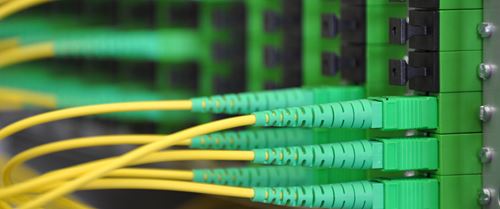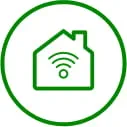We all know the internet is essential — whether we’re working, streaming our favorite shows or posting far too many photos of our adorable pets. But as more of us focus on living sustainably, it’s worth asking: Is fiber internet eco-friendly? The short answer is yes! Not only does fiber optic internet offer ridiculously fast speeds, but it also happens to be one of the greener options when it comes to connecting you to the web. So, let’s take a look at why fiber internet might be the eco-conscious choice you didn’t even know you needed.
What is fiber internet? (And why should you care?)
Before we jump into its green credentials, here’s a quick rundown: Fiber internet uses light signals to transmit data through ultra-thin strands of glass or plastic, instead of relying on the old-school copper wires used by cable or DSL connections. Think of fiber as the sleek new racecar of the internet world — it’s faster, more reliable and way more efficient than the beat-up old station wagon that copper cables represent.
Now, you might be wondering: How does this speedy internet also help the environment? Well, sit tight because fiber internet has more up its eco-friendly sleeve than just high speeds.
Fiber vs. copper: The ultimate green showdown
Energy efficiency: Fiber internet uses light to transmit data, which is not only super cool but also incredibly energy efficient. Fewer energy-hungry devices on the network mean a smaller carbon footprint — and who doesn’t love saving the planet while binge-watching their favorite shows?
Durability: Fiber optic cables are the marathon runners of the internet world. They can last for decades with minimal maintenance, unlike copper wires that tend to corrode, degrade and need replacing far more often. Fewer replacements mean fewer resources used, which translates to less waste and fewer emissions.
Materials: When it comes to production, fiber optic cables are made from glass, which is derived from sand — a much more abundant and environmentally friendly resource than copper. Plus, fiber optic cables are lighter and require less raw material overall, making them easier to transport and install. Fewer trucks on the road delivering heavy copper cables means less fuel burned and less pollution. Win-win!
Cutting down on data-center energy use
Fiber internet doesn’t just stop being green once it’s installed in your home or business. It also helps reduce energy consumption in the places that power the internet-data centers. Data centers are notorious energy guzzlers, responsible for about 1% of global electricity use. But because fiber internet is more efficient at transmitting data, it helps lower the energy demand in these data centers.
Think of it this way: Fiber internet lets data zip from point A to point B so quickly that the servers can kick back, relax and use less power. Less time working means fewer resources spent, which equals a smaller carbon footprint.
Supporting a greener future, one fiber strand at a time
Fiber internet isn’t just good for today’s Netflix marathon — it’s also paving the way for a more sustainable future. Here are a few ways fiber is helping build a greener world:
Remote work: With fiber’s fast, reliable internet, working from home (or anywhere with WiFi) is easier than ever. This means fewer people commuting, less traffic on the roads and fewer emissions from all those cars stuck in rush-hour traffic. Fiber internet is basically the internet version of carpooling — except way faster and you don’t have to make awkward small talk.
Smart homes and devices: Fiber internet is the backbone of the smart home revolution. It supports all the gadgets that help you save energy, like smart thermostats, energy-efficient lighting and appliances that know when to shut off. All these eco-friendly devices rely on fast internet to function properly, and fiber ensures they can do their job without a hitch.
Telemedicine: Fiber also plays a big role in the growing world of telemedicine, allowing people to see their doctors virtually instead of driving to appointments. Less time on the road means fewer emissions, and less time in waiting rooms means you’re not stuck reading all those outdated magazines.
Ziply Fiber’s green commitment
At Ziply Fiber, we’re all about speed, reliability and making the internet better for both you and the environment. As we continue to expand our fiber network across the Northwest, we’re committed to using energy-efficient technology and sustainable practices in everything we do. Our fiber optic infrastructure is built to last, which means fewer materials wasted over time and a lower overall environmental impact.
We also take care to manage the energy used by our data centers and equipment, so when you stream that nature documentary in 4K, you can feel good knowing your internet service is doing its part to help protect the environment.
Fast, reliable and eco-friendly? Yes, please!
Fiber internet isn’t just a game-changer for speed and reliability — it’s also an eco-friendly upgrade for your home or business. From using less energy and fewer materials to supporting remote work and sustainable technologies, fiber helps reduce the environmental footprint of our increasingly digital lives.
So, if you’re looking to upgrade your internet (and maybe save the planet along the way), fiber is the way to go. And with Ziply Fiber, you get all the speed and reliability you need, backed by a company that cares about the future of our planet. Interested in learning more? Visit our website or contact us today, and let’s get you connected to a greener tomorrow.






